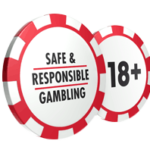Responsible Gambling – How To Stay In Control
.Have you ever heard about responsible gambling? Responsible gambling is a very important matter when you like online gambling, so please keep reading and stay safe at all times!
Gambling is an exciting form of entertainment that millions of people from all over the world enjoy daily. Casino games, betting, and other types of pastimes where the potential to win money is involved can be  extremely fun and also lucrative at times.
extremely fun and also lucrative at times.
However, gambling also has a downside and it’s associated with certain risks. We’re talking about risks besides the obvious risk of losing the money you’re playing with.
On the following page, we’ll discuss these risks and how you can spot that you or someone close to you is losing control. We’ll also go into detail about what you can do to prevent these risks and provide tips on how to stop it and regain control when needed. Responsible gambling is a must!
You see, even though we run this site to help you become a better casino player or teach you how to improve your sports betting strategies, we also have a responsibility to keep our customers safe. And the best way to do that is to educate you about how to gamble responsibly.

The Risks of Gambling ⚠️
As mentioned, when playing at casinos or participating in sports betting – both online and “IRL” – there are certain risks that you have to be aware of. The main one being gambling addiction.
In fact, gambling addiction is a rather widespread issue that affects a lot of people, such as alcohol or drug addiction, the truth is that anyone can develop a gambling addiction.
A common myth is that only people who can’t afford to gamble can get addicted, which isn’t true at all. But let’s not get ahead of ourselves – let’s rewind and start from the top. In order to avoid this you should take responsible gambling very seriously!
What is a Gambling Addiction? 🔎
Gambling addiction is a disease, not a money issue. A gambling addiction, just like addictions to chemical substances, sex, etc. is classified as a mental health issue. It’s defined as an issue when the gambler can’t stop playing even when he or she realizes that it’s hurting their life and the life of people around them, and when the person no longer can control the urge to play regardless of the consequences of their actions.
A pathological gambler, often known as a gambling addict, does not get addicted to gambling after only one gambling session. A gambler goes through several stages before it becomes an addiction. In the course of enjoying a game of chance for fun and entertainment, the line between problematic behaviour and pathological gambling becomes increasingly blurred.
Progression to Gambling Addiction
At first, gambling is regarded as enjoyable, and any profits strengthen the allure and provide emotional experiences. Often, the player believes that it is their skill, and not luck, that brings them wins and increases bets and time spent gambling. The wagers get bigger and the gambling sessions get longer and more frequent.
As a player’s interests become increasingly centred around gambling, he also uses it to try and recreate the feeling of excitement. Gambling is hidden from loved ones, friends, coworkers, etc., which increases lying. Gamblers borrow money from whoever, or wherever they can to pay gambling debts or to continue gambling.
Eventually, it gets to the point where they are unable to stop gambling, even though they recognise the effect their gambling is having on their relationships, work and financial situation. At this point, gambling has become an addiction. As with all addictions, it comes with feelings of shame and guilt, as well as thoughts of suicide.
Who is at Risk of Becoming Addicted to Gambling?
Anyone can become a pathological gambler when they’re not aware of responsible gambling. There are some people who fail into the higher risk category.
- Access to gambling has been shown to increase the risk.
- Unemployment or people in the low-income category range are vulnerable,
- Thrill-seekers and less impulsive people are at risk.
- People, especially men, under 30 are at risk.
- Older people who play games such as bingo and slot machines also fall into this category
- It is common for compulsive gamblers to have problems with substance abuse, personality disorders, depression, or anxiety. The compulsive habit of gambling may also be linked to bipolar disorder, obsessive-compulsive disorder (OCD), and attention-deficit/hyperactivity disorder (ADHD).
Reasons Why People Become Addicted to Gambling 📖
There are many reasons why people become addicted to gambling. For some, it’s solely psychological or social and based on their personal relationship to gambling.
 For others, it’s biological. It’s actually been proven that children of addicts are genetically predisposed to develop their own addictions.
For others, it’s biological. It’s actually been proven that children of addicts are genetically predisposed to develop their own addictions.
Lastly, people who are already addicted to something else such as alcohol have an increased risk of getting addicted to other things, including gambling.
Furthermore, gambling addiction is usually divided into two categories, and even though they are slightly different, they are equally as bad and potentially as harmful. Luckily this can be avoided when gambling responsibly!
Compulsive Addition
A person that has a compulsive gambling addiction has no power over their urge or desire to play at all. They continue playing even when they know they can’t afford it and they actively hurt themselves, their professional and personal life, as well as the people around them, just to continue playing.
This type of addiction is a constant part of the gambler’s life and is, therefore, more obvious and often easier to spot than the next category.
Binge Gambling
A binge gambling addict is defined as someone that can’t control their urge to play during certain periods but not all the time. In turn, this means that they can often trick themselves and others into thinking that they have control since they’re not always playing. However, when the desire does kick in, the binge gambler, just like the compulsive gambler, has no control at all.
In some ways, this type of addiction can be worse since the addiction can go on for longer before it becomes obvious that it is, in fact, a problem.
FAQ 🙋
Frequently asked questions about Responsible Gambling
🕵️ What is responsible gambling?
Responsible gambling is making players aware of the risk related to gambling for real money. It raises awareness on things to avoid and to take into consideration to avoid a gambling addiction or loss of money.
🦺 How can I gamble responsibly?
- Set limits for spending and keep yourself to the limits.
- Seek help.
- Never change losses.
- Don’t spend money you can’t afford to loose.
- Take play breaks
💁 Does every online casino offer responsible gambling?
They should! If they don’t it’s better not to play there!
🤝 Do i need help?
If you’re loosing more than you can afford to lose, can’t stop playing and are getting frustrated it’s time to look for help!
📍 Were can I find help?
- Hope Trust India
- De-Addictions Centres
- Gamblers Anonymous
- Indian Research
📝 What are the golden rules for gambling responsibly?
- Education
- Entertainment
- Limits
- Funding
- Superstition
- Influence & Mood
Complications Associated with Gambling Addiction ☠️
As we’ve already mentioned, pathological gambling may have significant and lasting effects on your life, including;
- Relationship problems with your significant other, family members, friends and work colleagues.
- Financial problems, including bankruptcy. Compulsive gamblers will do anything to get money for gambling such as using money meant for living expenses, taking out loans, fraud and stealing money.
- Legal problems or imprisonment, usually due to not being about to settle debts or being caught stealing.
- Performing poorly at work or losing your job
- Poor general health is brought on by stress and depression.
- Suicide, suicide attempts or suicidal thoughts
Signs That You’re Losing Control ⚡
With a better idea of what a gambling addiction is, we’ll take a look at the signs that someone has lost control over their gambling.
Inability to Stop Thinking About Gambling
One of the first indications that someone is developing a gambling addiction is that they are continuously thinking about how they might get more money and indulge in more gambling. In other words, it becomes a constant part of the person’s life, even when they’re not gambling.
For example, addicts can often spend all day thinking about other times they’ve gambled or plan their next session.
Increased Risk-Taking
Addicts are often forced to take greater and greater risks to satisfy their desire. Similar to a drug addict that has to increase the dose to reach the same high, a gambler has to increase the amount they spend to reach the same level of excitement.
One should never play using money they can’t afford to lose, and gambling should never be a financial priority.
Anger Towards Anyone Claiming There Is a Problem
People with a gambling problem tend to get angry and frustrated when others comment on their problem or ask them to stop or cut back. Similarly, they get stressed and anxious when they can’t gamble for some reason.
Not being able to gamble should never be a problem.
Chasing Losses to Get Even
One of the golden rules of gambling is to never chase losses because it’s a sure way to lose more and create bad habits. Every gambler has to accept the fact that they will lose at times, and when that happens it’s important to stop and start over.
It is technically impossible to make even or win back losses when gambling and trying to do so, is extremely dangerous.
Gambling to Cope with Distress or as a Reward
All sorts of gambling, both on casinos and sports betting, is nothing more than paid entertainment that one does in their spare time. It should never be used as a tool to combat distress, depression or other negative feelings.
Gambling should also not be used as a form of reward for having done something less enjoyable.
Lying To Cover Up
What many people don’t understand is that most addicts are fully aware of their issues, even though they won’t admit it to anyone, including themselves. Subsequently, their issues are almost always associated with shame.
Because of that, they soon start lying about how much they play and how much they lose.
Now, these six points are considered the foundation of gambling addiction and the signs are used to diagnose addiction. That being said, the list isn’t complete and there are many other signs of when a recreational interest in gambling becomes an issue.
How To Stop Gambling and Regain Control 🛑
When you haven’t been gambling responsibly and if you think that you might have an issue or feel like you’re developing bad habits you must seek help. The matter of fact is that most people can’t stop gambling on their own, just like most drug addicts can’t stop taking drugs without help.
It can be very challenging to stop problem gambling, but if you do, the struggle is to keep stopping. It is exceedingly challenging for former problem gamblers to participate in leisure gaming once more, due to the desire to place a bet.
To have a full and healthy life, most problem gamblers—if not all—need a treatment strategy focused on abstinence. An effective recovery program must be in place to avoid relapse in order to sustain abstinence.
Stopping Gambling On your own
Obviously, there are exceptions to this rule and if you’re able to stop on your own, you should. Here are eight things that can help you with your journey.
- Be prepared for boredom. As you would have been used to filing spare time with gambling, you will need to plan how to use the time differently. This can initially be perceived as boring as you probably won’t experience the adrenaline rushes you are used to.
- Take each day one at a time. Each day is a new opportunity. Focus on getting through today, forget about yesterday and don’t think about tomorrow until it arrives.
- Try new things. Your brain will need to be stimulated. Try doing something new. It doesn’t have to be a big project or hobby, it can be something small like learning how to bake bread or raise a plant. Try and make it something that will prove your brain the chance to use its problem-solving skills.
- Revive an old interest. Pick up that book you didn’t finish reading or that craft or DIY project you never completed. It will remind you of what you used to enjoy and make you feel confident when you have completed it.
- Be aware of your triggers. If you used to bet on sporting events such as Wimbledon or the IPL Cricket league, you can strongly feel the need to gamble when they are being played. Try to avoid social media or media outlets that you know will be focused on them.
- Look for strategies to reduce your stress. Whatever stress you experienced before is not going to go away. Learn how to manage your stress in a positive way. That could be taking up gardening, exercising, meditating or chatting with someone who will listen without judgement. The more stressed you are, the more you will feel the need to gamble.
- Don’t forget that gamblers seldom win big. You will convince yourself that one more flutter with win you the big one and you will solve all of your problems. Take the time to remind yourself that this is not the case and that you will just continue the cycle if you bet again.
- Make a gratitude journal. It may sound cliche, but taking the time to write down how your life has changed for the better is very self-healing. As you remind yourself of the things in life you are grateful for, it will reinforce them and help you to appreciate them more.
Online Casino Limits and Restrictions
Some people might feel that setting self-imposed restrictions allows them to maintain a reasonable level of online gambling behaviour. Today, most gambling sites let you set up gambling limits and you can even block your access to sites as part of their responsible gambling program.
Players have the option of choosing one or more limitations or temporarily suspending their active casino account. They can choose a restriction or suspension by choosing the limit or limits that best suit their requirements.
Most casinos will offer at least one of the following self-imposed limits;
- Deposit Limit
- Spending Limit
- Betting Limit
- Daily Time-based Limit
- Temporary Suspension
Although this may work for some people, if your gambling is too far out of control, it may be better to request a permanent restriction. This means that the casino will not allow you to play there again. In order to have this self-imposed ban lifted, you will need to contact the casino and request it.
Responsible casinos will have staff trained in responsible gambling who will not take the request to gamble again lightly. There are even casinos that go the extra mile and will contact you if they spot signs of compulsive gambling to advise you to reach out.
You will most likely need support and help from others and there is nothing wrong with that. With that said, the first rule of fighting any addiction is to admit that you have an addiction, which is often the hardest part.
Below, we’ve listed some of the most effective and common ways to get help to combat gambling addiction.
Therapy
Most experts recommend that you contact your regular doctor as soon as you think there is a problem. The doctor can, in turn, either help you or point you in the right direction.
One of the best reasons to go through a doctor is that your problem becomes official and that you automatically involve people that you don’t have a personal relationship with. That way, it becomes harder to run from the problem later.
Counselling for Quitting Gambling
Any past emotional scars that are impeding your progress might be healed through counselling and talking therapy. Building rapport and trust with a therapist can make it easier to pinpoint personal relapse risks, and covert triggers, and to create a maintenance strategy for your recovery.
There are also support groups available for you to talk with people who are experiencing similar problems.
Gamblers Anonymous (GA)
Gamblers Anonymous (GA) is a great start and many times it’s the first step people take towards help. GA based on the same concept as Alcoholic Anonymous (AA) and can be found all over the world.
You don’t have to register to partake in a GA meeting. Instead, you can just show up and take it from there. And don’t worry, you’re not the first to just show up, and you’re also not the last.
Medical Treatment
For some, Gamblers Anonymous or therapy isn’t enough and then, medical treatment such as antidepressants and rehab is the only solution. It should not be forgotten that gambling can be part of a bigger problem, such as a mental health issue. By seeking out medical treatment, you can also get the right assistance for your mental health condition, if this is the case.
In most parts of the world, you can sign yourself into rehab but, once again, it’s recommended that you go through your regular doctor.
What To Do If Someone Close to You Gambles Too Much 👋
Do you think a relative, friend or co-worker is suffering from a gambling problem or is not gambling responsible? It’s important that you act. You can do this by letting the said person know how you feel or encouraging the person to seek help.
As mentioned, most addicts know that they have a problem and many, although not all, are relieved to get help and recognition.
However, before you act and confront a person with a potential problem, we suggest you educate yourself on the matter so that you’re better prepared by looking into responsible gambling. And remember to always be supportive and non-judgmental, otherwise, chances are that you’ll make the situation worse and limit your ability to have an influence.
Naturally, if you think the problem is too big or you don’t know what to do, you too can seek help through GA or a doctor.
Talking to a person who has a problem is not an easy feat, and the chances are that just speaking to them will affect you. Remember that you are doing it to help them. Also, nothing that you say is going to make them stop. That is a long process they have to go through themselves, with your support and understanding.
Like many addicts, the chances that they will deny the problem, or try to make it sound like you are the root cause, this is not the truth. Harsh words will have a negative effect on your relationship. Here are some suggestions we feel could help both you and the gambler;
- Tell the gambler what their gambling is doing to you and how it makes you feel bad. Express your emotions in a thoughtful and honest manner.
- Avoid attempting to manage the gambler’s life. It won’t work and you’ll be miserable as a result.
- Inform the gambler that you wish to assist. They could experience a loss of control, embarrassment, or humiliation. You can suggest that you’ll be there for them.
- Treat them equally in all respects. Don’t attempt to shield them.
- Don’t take on their burden; rather, assist them in their battle. Saying “I won’t do something for you, but I’ll be here with you while you do it” is an option.
- Let them accept accountability for their actions. Let them handle their job and creditors, for instance. Don’t aid them in their lies and deceit.
The Golden Rules of Gambling Safely and Preventing Problems 🌟
There are many “unwritten” rules about how you should play at online casinos and bet money on sports in a healthy way and they’re the best ways to protect yourself from bad habits. Take these responsible gambling tips into account and avoid the worst!
Education | The more you know about the games you play and the risks involved, the bigger your chance of not developing a problem gets. So make sure you’re prepared and have a good understanding. |
Entertainment | Never forget that gambling is nothing more than paid entertainment. As soon as it becomes a routine or even a potential source of extra income, you’ve entered the danger zone. |
Limits | Setting limits for yourself is a great way to control your gambling. Make a budget and make sure you always stick with it and set up time limits regarding how much and often you can play. Many gambling sites and online casinos let you do this through your personal account. |
Funding | Never, ever play with money you can’t afford to lose and never chase your losses. These two rather simple rules are incredibly efficient as long as you take them seriously. |
Superstition | In the end, all forms of gambling rely on chance and luck and there is nothing you can do to change that. Even if you think that you have a lucky number or a certain online casino that serves you better. You must remember that it’s not the case. |
Influence & Mood | Since gambling is entertainment associated with risk, you shouldn’t play unless you’re sober and you should not play unless you’re in a good headspace. Playing to combat anxiety or depression is also a recipe for disaster. |
Resources 👓
There are many options for Indian players to seek help with a gambling addiction, some of the main ones supporting responsible gambling are listed below.
Hope Trust India
Hope Trust India provides drug and gambling rehabilitation in India and can help you get the support and treatments you need. Their site is a great resource for anyone dealing with addiction.
De-Addictions Centres
De-Addictions Centres is an organisation that operates rehabilitation centres and provides professional support for gambling addicts in India. Visit their site here
Gamblers Anonymous
Gamblers Anonymous are available in several locations in India and their meetings are open to everyone. You can find their addresses and planned GA meetings here.
Indian Research
You can read more about gambling addiction research funded by the Indian government on this site.
Choose responsible gambling and have fun! Playing online casinos should always be a fun experience!


